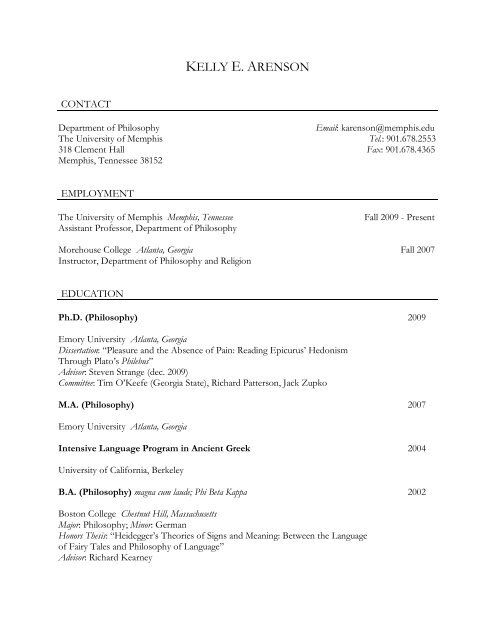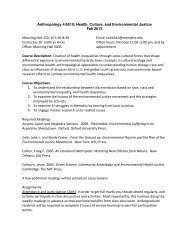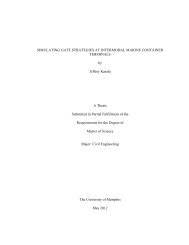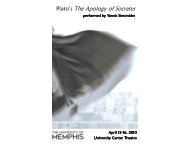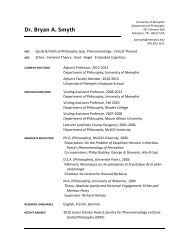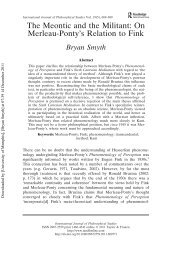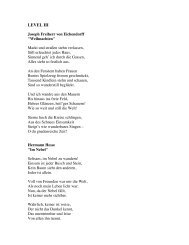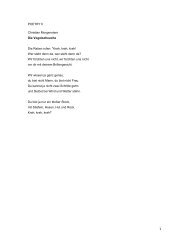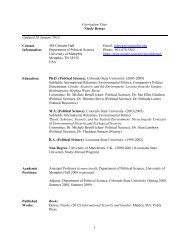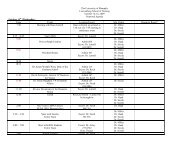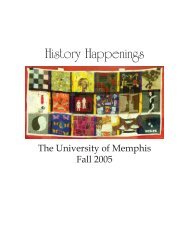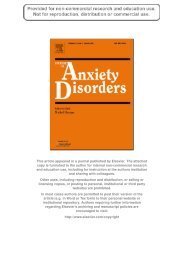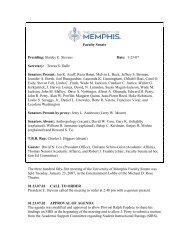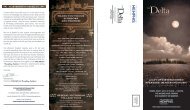KELLY E. ARENSON - University of Memphis
KELLY E. ARENSON - University of Memphis
KELLY E. ARENSON - University of Memphis
Create successful ePaper yourself
Turn your PDF publications into a flip-book with our unique Google optimized e-Paper software.
CONTACT<br />
<strong>KELLY</strong> E. <strong>ARENSON</strong><br />
Department <strong>of</strong> Philosophy Email: karenson@memphis.edu<br />
The <strong>University</strong> <strong>of</strong> <strong>Memphis</strong> Tel.: 901.678.2553<br />
318 Clement Hall Fax: 901.678.4365<br />
<strong>Memphis</strong>, Tennessee 38152<br />
EMPLOYMENT<br />
The <strong>University</strong> <strong>of</strong> <strong>Memphis</strong> <strong>Memphis</strong>, Tennessee Fall 2009 - Present<br />
Assistant Pr<strong>of</strong>essor, Department <strong>of</strong> Philosophy<br />
Morehouse College Atlanta, Georgia Fall 2007<br />
Instructor, Department <strong>of</strong> Philosophy and Religion<br />
EDUCATION<br />
Ph.D. (Philosophy) 2009<br />
Emory <strong>University</strong> Atlanta, Georgia<br />
Dissertation: “Pleasure and the Absence <strong>of</strong> Pain: Reading Epicurus’ Hedonism<br />
Through Plato’s Philebus”<br />
Advisor: Steven Strange (dec. 2009)<br />
Committee: Tim O’Keefe (Georgia State), Richard Patterson, Jack Zupko<br />
M.A. (Philosophy) 2007<br />
Emory <strong>University</strong> Atlanta, Georgia<br />
Intensive Language Program in Ancient Greek 2004<br />
<strong>University</strong> <strong>of</strong> California, Berkeley<br />
B.A. (Philosophy) magna cum laude; Phi Beta Kappa 2002<br />
Boston College Chestnut Hill, Massachusetts<br />
Major: Philosophy; Minor: German<br />
Honors Thesis: “Heidegger’s Theories <strong>of</strong> Signs and Meaning: Between the Language<br />
<strong>of</strong> Fairy Tales and Philosophy <strong>of</strong> Language”<br />
Advisor: Richard Kearney
Intensive Language Course and <strong>University</strong> Preparation in German 2000<br />
Goethe-Institut Dresden, Germany<br />
AREAS OF SPECIALIZATION AREAS OF COMPETENCE<br />
Ancient Philosophy Twentieth-Century Continental Philosophy<br />
Ethics Philosophy <strong>of</strong> Science<br />
Political Philosophy<br />
PUBLICATIONS<br />
“Natural and Neutral States in Plato’s Philebus,” forthcoming in Apeiron.<br />
“Pleasure,” in the Oxford Encyclopedia <strong>of</strong> Ancient Greece and Rome, ed. M. Gagarin et al. (Oxford<br />
<strong>University</strong> Press, 2009).<br />
“Erotic and Servile Pleasures in Plato’s Phaedrus,” under review.<br />
BOOK REVIEWS<br />
Review <strong>of</strong> A Life Worthy <strong>of</strong> the Gods: The Materialist Psychology <strong>of</strong> Epicurus, by David Konstan. Journal <strong>of</strong><br />
the History <strong>of</strong> Philosophy, no. 48 (2010): 95-6.<br />
WORKS IN PROGRESS<br />
Book:<br />
Health and Hedonism in Plato and Epicurus.<br />
Articles:<br />
“Health and Hedonism in Epicurean Ethics.”<br />
“The Pleasures <strong>of</strong> Psychic Harmony in Plato’s Republic.”<br />
“Is Epicurean Joy Kinetic or Katastematic?”
PRESENTATIONS<br />
“Plotinus and Porphyry on the Faculty <strong>of</strong> Attention,” to be presented at the Meeting <strong>of</strong> the<br />
International Society for Neoplatonic Studies (ISNS) held at the Eastern Meeting <strong>of</strong> the American<br />
Philosophical Society, December 2010.<br />
“Pleasure, Health, and the Soul in Plato’s Republic,” to be presented at the <strong>University</strong> <strong>of</strong> Western<br />
Ontario, October 2010.<br />
“Epicurus on the Pleasure <strong>of</strong> Health,” to be presented at the Society for Ancient Greek Philosophy<br />
(SAGP) Annual Conference, Fordham <strong>University</strong>, October 2010.<br />
“The Pleasures <strong>of</strong> Psychic Harmony in Plato’s Republic,” the Pacific Meeting <strong>of</strong> the American<br />
Philosophical Association, April 2010.<br />
“Erotic and Servile Pleasures in Plato’s Phaedrus,” the 33 rd Annual Ancient Philosophy Workshop,<br />
the <strong>University</strong> <strong>of</strong> Texas at Austin, March 2010. (Note: this paper is a significantly revised and<br />
expanded version <strong>of</strong> the identically-titled paper presented in October 2009.)<br />
“Health and Hedonism in Epicurean Ethics,” Duquesne <strong>University</strong> Philosophy Department,<br />
October 2009.<br />
“Erotic and Servile Pleasures in Plato’s Phaedrus,” Society for Ancient Greek Philosophy (SAGP)<br />
Annual Conference, Fordham <strong>University</strong>, October 2009.<br />
“The Perception Requirement in Plato’s Philebus,” the Pacific Meeting <strong>of</strong> the American Philosophical<br />
Association, April 2009.<br />
“Natural and Neutral States in Plato’s Philebus,” the 32 nd Annual Ancient Philosophy Workshop,<br />
sponsored jointly by the <strong>University</strong> <strong>of</strong> Texas at Austin and the Universidad Nacional Autónoma de<br />
México, Mexico City, March 2009.<br />
“How to be Natural: Organic States in Plato’s Philebus.”<br />
○ Saint Vincent College, February 2009.<br />
○ The <strong>University</strong> <strong>of</strong> <strong>Memphis</strong>, February 2009.<br />
○ The <strong>University</strong> <strong>of</strong> North Florida, January 2009.<br />
“Augustine’s Defense and Redemption <strong>of</strong> the Body,” the North Texas Philosophical Association<br />
2007 Meeting, April 2007.<br />
“Dworkin’s Critique <strong>of</strong> Legal Positivism,” Loyola <strong>University</strong> Chicago Graduate Student Philosophy<br />
Conference, March 2006.<br />
“The Paradox <strong>of</strong> the Poet: the Necessity <strong>of</strong> Inauthenticity to the Poetic Life,” DePaul <strong>University</strong><br />
Graduate Student Philosophy Conference, April 2005.
CONFERENCE RESPONSES<br />
Maria Angélica Fierro, “tōn phaulōn ti en hēmin in Republic 10.602c-608b,” 29 th Annual Ancient<br />
Philosophy Workshop, Emory <strong>University</strong>, April 2006.<br />
FELLOWSHIPS AND AWARDS<br />
Andrew W. Mellon Foundation/American Council <strong>of</strong> Learned Societies (ACLS) Dissertation<br />
Completion Fellowship, 2008 - 2009 (899 applicants for 65 awards).<br />
Scholar in Residence, Duquesne <strong>University</strong>, Pittsburgh, Pennsylvania, 2008 - 2009.<br />
George W. Woodruff Fellowship, Emory <strong>University</strong>, 2003 - 2008 (only 15 such awards in each<br />
entering class <strong>of</strong> the Graduate School <strong>of</strong> Arts and Sciences).<br />
United States Fulbright Grant, 2002 - 2003, Albert-Ludwigs Universität, Freiburg, Germany. Grant<br />
for independent research on the topic, “Heidegger and Language: Being and Time in the Context <strong>of</strong><br />
Poetry and Prose.”<br />
John Bapst Philosophy Medal, Boston College, 2002 (most outstanding student <strong>of</strong> philosophy in the<br />
class <strong>of</strong> 2002).<br />
John F. Norton Award, Boston College, 2002 (most outstanding student in the humanities in the<br />
class <strong>of</strong> 2002).<br />
Boston College Undergraduate Research Fellowship, January 2000 – May 2002 (research under Dr.<br />
Ronald Anderson in topics in the philosophy <strong>of</strong> science and mathematics).<br />
Boston College Advanced Study Grant, Summer 2000 (full scholarship for study at the Goethe-<br />
Institut in Dresden, Germany).<br />
TEACHING EXPERIENCE<br />
The <strong>University</strong> <strong>of</strong> <strong>Memphis</strong> <strong>Memphis</strong>, Tennessee<br />
The Body and the Non-Rational in Platonic Philosophy (PHIL 7201/8201), Fall 2010 (graduate<br />
seminar).<br />
Ancient Ethics: Hedonism and Anti-Hedonism (PHIL 4211/6211), Spring 2010 (graduate and<br />
undergraduate combined).<br />
Foundations <strong>of</strong> Western Philosophy: Classical Period (PHIL 3001), Fall 2009 (undergraduate).<br />
Values in the Modern World (PHIL 1102), Fall 2009, Spring 2010 (undergraduate).<br />
Fundamental Issues in Philosophy (PHIL 1101), Fall 2010 (undergraduate).
Morehouse College Atlanta, Georgia<br />
Introduction to Philosophical Ethics (PHI 302): Fall 2007 (undergraduate).<br />
Emory <strong>University</strong> Atlanta, Georgia<br />
Instructor, Introduction to Ethics (PHIL 115): Fall 2007 (undergraduate).<br />
Co-teacher with Dr. Steven Strange, Seminar in Ancient Philosophy: Plato and Platonism (PHIL<br />
367): Fall 2005 (undergraduate).<br />
Teaching Assistant<br />
(Responsible for grading, leading review sessions, and meeting with students during<br />
<strong>of</strong>fice hours.)<br />
o Social and Political Philosophy (PHIL 332).<br />
o History <strong>of</strong> Western Thought I (PHIL 250).<br />
o History <strong>of</strong> Western Thought II (PHIL 251).<br />
Teaching Assistant Training and Teaching Opportunity Program (TATTO), Emory <strong>University</strong><br />
o Participant in week-long seminar on grading, writing syllabi, lecturing, and leading<br />
discussions, Fall 2004.<br />
o Participant in one-semester pedagogy course in the philosophy department, Fall<br />
2004.<br />
Teaching Interests<br />
o Ancient Philosophy and Ethics ○ Philosophy <strong>of</strong> the Body<br />
o Hellenistic Philosophy ○ Philosophy <strong>of</strong> Science<br />
o Introduction to Ethics ○ Plato<br />
o Legal Theory ○ Political Philosophy<br />
SERVICE<br />
Referee, Southern Journal <strong>of</strong> Philosophy<br />
Selection Committee for the Marcus Orr Humanities Scholarship, The <strong>University</strong> <strong>of</strong> <strong>Memphis</strong>, 2010.<br />
Master’s Thesis Committee <strong>of</strong> Jacob Neal, The <strong>University</strong> <strong>of</strong> <strong>Memphis</strong>, 2009-10.<br />
Faculty Advisor to the Philosophy Circle, the undergraduate philosophy society at The <strong>University</strong> <strong>of</strong><br />
<strong>Memphis</strong>, 2009-Present.<br />
History <strong>of</strong> Ancient Philosophy Comprehensive Exam (PhD and MA) Committee, The <strong>University</strong> <strong>of</strong><br />
<strong>Memphis</strong>, 2009-Present.<br />
Chair, Philosophy <strong>of</strong> Science Comprehensive Exam Committee (MA), The <strong>University</strong> <strong>of</strong> <strong>Memphis</strong>,<br />
2010-Present.
Three PhD Student Advisory Committees in the Philosophy Department, The <strong>University</strong> <strong>of</strong><br />
<strong>Memphis</strong>, 2009-Present.<br />
Moderator, Society for Ancient Greek Philosophy (SAGP) Annual Conference, October 2009.<br />
PROFESSIONAL AFFILIATIONS<br />
Society for Ancient Greek Philosophy<br />
The American Philosophical Association<br />
REFERENCES<br />
Dr. Richard Patterson, Philosophy Department, Emory <strong>University</strong>.<br />
404.727.0106. rpatt01@emory.edu.<br />
Dr. Jack Zupko, Philosophy Department, Emory <strong>University</strong>.<br />
404.727.0104. jzupko@emory.edu.<br />
Dr. Tim O’Keefe, Philosophy Department, Georgia State <strong>University</strong>.<br />
404.413.6108. tokeefe@gsu.edu.<br />
GRADUATE COURSEWORK<br />
Ancient Philosophy: Medieval Philosophy (Directed Study)<br />
Ancient Hedonism (Directed Study) Philosophical Anthropology<br />
Aristotle and His Commentators Rationalism<br />
Hellenistic Philosophy Schleiermacher<br />
Plato<br />
Platonic Ethics and the Platonist Tradition Ethics and Practical Philosophy:<br />
Plato’s Timaeus in the Western Tradition Contemporary Legal Theory<br />
Philosophy and Pedagogy<br />
History <strong>of</strong> Philosophy and Continental: Philosophy <strong>of</strong> Social Science<br />
Existentialism Symbolic Logic<br />
Hegel’s Phenomenology <strong>of</strong> Spirit Twentieth-Century Ethics<br />
Kant’s Critique <strong>of</strong> Pure Reason Virtue Ethics


